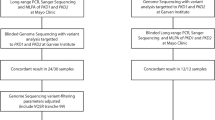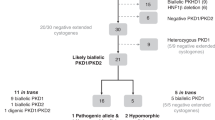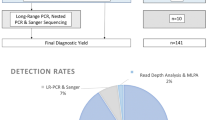Abstract
Autosomal Dominant Polycystic Kidney Disease (ADPKD) accounts for 2.6% of the patients with chronic kidney disease in India. ADPKD is caused by pathogenic variants in either PKD1 or PKD2 gene. There is no comprehensive genetic data from Indian subcontinent. We aimed to identify the pathogenic variants in the heterogeneous Indian population. PKD1 and PKD2 variants were identified by direct gene sequencing and/or multiplex ligation-dependent probe amplification (MLPA) in 125 unrelated patients of ADPKD. The pathogenic potential of the variants was evaluated computationally and were classified according to ACMG guidelines. Overall 300 variants were observed in PKD1 and PKD2 genes, of which 141 (47%) have been reported previously as benign. The remaining 159 variants were categorized into different classes based on their pathogenicity. Pathogenic variants were observed in 105 (84%) of 125 patients, of which 99 (94.3%) were linked to PKD1 gene and 6 (6.1%) to PKD2 gene. Of 159 variants, 97 were novel variants, of which 43 (44.33%) were pathogenic, and 10 (10.31%) were of uncertain significance. Our data demonstrate the diverse genotypic makeup of single gene disorders in India as compared to the West. These data would be valuable in counseling and further identification of probable donors among the relatives of patients with ADPKD.
Similar content being viewed by others
Log in or create a free account to read this content
Gain free access to this article, as well as selected content from this journal and more on nature.com
or
References
Torres VE, Harris PC, Pirson Y. Autosomal dominant polycystic kidney disease. Lancet. 2007;369:1287–301.
Torres VE, Harris PC. Autosomal dominant polycystic kidney disease: the last 3 years. Kidney Int. 2009;76:149–68.
Rajapurkar MM, John GT, Kirpalani AL, Abraham G, Agarwal SK, Almeida AF, et al. What do we know about chronic kidney disease in India: first report of the Indian CKD registry. BMC Nephrol. 2012;13:10.
Spithoven EM, Kramer A, Meijer E, Orskov B, Wanner C, Caskey F, et al. Analysis of data from the ERA-EDTA Registry indicates that conventional treatments for chronic kidney disease do not reduce the need for renal replacement therapy in autosomal dominant polycystic kidney disease. Kidney Int. 2014;86:1244–52.
Hughes J, Ward CJ, Peral B, Aspinwall R, Clark K, Millan JLS, et al. The polycystic kidneydisease1 (PKD1) gene encodes a novel protein with multiple cell recognition domains. Nat Genet. 1995;10:151–60.
Watnick TJ, Piontek KB, Cordai TM, Weber H, Gandolph MA, Qian F, et al. An unusual pattern of mutation in the duplicated portion of PKD1 is revealed by use of a novel strategy for mutation detection. Hum Mol Genet. 1997;6:1473–81.
Hayashi T, Mochizuki T, Reynolds DM, Wu G, Cai Y, Somlo S. Characterization of the exon structure of the polycystic kidney disease 2 gene (PKD2). Genomics. 1997;44:131–6.
Tan Y-C, Blumenfeld J, Rennert H. Autosomal dominant polycystic kidney disease: Genetics, mutations and microRNAs. Biochim Biophys Acta. 2011;1812:1202–12.
Audrézet MP, Cornec-Le Gall E, Chen JM, Redon S, Quéré I, Creff J, et al. Autosomal dominant polycystic kidney disease: comprehensive mutation analysis of PKD1 and PKD2 in 700 unrelated patients. Hum Mutat. 2012;33:1239–50.
Carrera P, Cal S, Magistroni R, Dunnen JT, Rigo F, Stenirri S. et al. Deciphering variability of PKD1 and PKD2 in an Italian cohort of 643 patients with autosomal dominant polycystic kidney disease (ADPKD). Sci Rep. 2016;6:1–13.
Hwang Y-H, Conklin J, Chan W, Roslin NM, Liu J, He N. et al. Refining genotype–phenotype correlation in autosomal dominant polycystic kidney disease. J Am Soc Nephrol. 2016;27:1861–8.
Rossetti S, Consugar MB, Chapman AB, Torres VE, Guay-Woodford LM, Grantham JJ, et al. Comprehensive molecular diagnostics in autosomal dominant polycystic kidney disease. J Am Soc Nephrol. 2007;18:2143–60.
Kurashige M, Hanaoka K, Imamura M, Udagawa T, Kawaguchi Y, Hasegawa T, et al. A comprehensive search for mutations in the PKD1 and PKD2 in Japanese subjects with autosomal dominant polycystic kidney disease. Clin Genet. 2015;87:266–72.
Barua M, Cil O, Paterson AD, Wang K, He N, Dicks E, et al. Family history of renal disease severity predicts the mutated gene in ADPKD. J Am Soc Nephrol. 2009;20:1833–8.
Harris PC, Bae KT, Rossetti S, Torres VE, Grantham JJ, Chapman AB, et al. Cyst number but not the rate of cystic growth is associated with the mutated gene in autosomal dominant polycystic kidney disease. J Am Soc Nephrol. 2006;17:3013–9.
Ravine D, Gibson RN, Walker RG, Sheffield LJ, Kincaid-Smith P, Danks DM. Evaluation of ultrasonographic diagnostic criteria for autosomal dominant polycystic kidney disease 1. Lancet. 1994;343:824–7.
National Kidney Foundation. K/DOQI clinical practice guidelines for chronic kidney disease: evaluation, clasification and stratification. Am J Kidney Dis. 2002;39:1–266. p
Miller SA, Dykes DD, Polesky HF. A simple salting out procedure for extracting DNA from human nucleated cells. Nucleic Acids Res. 1988;16:55404–55404.
Rossetti S, Chauveau D, Walker D, Saggar-Malik A, Winearls CG, Torres VE, et al. A complete mutation screen of the ADPKD genes by DHPLC. Kidney Int. 2002;61:1588–99.
Liu W, Chen M, Wei J, Sun X, Shi Y, He W, et al. Modification of PCR conditions and design of exon-specific primers for the efficient molecular diagnosis of PKD1 mutations. Kidney Blood Press Res. 2014;39:536–45.
Dunnen JT, den, Dalgleish R, Maglott DR, Hart RK, Greenblatt MS, Mcgowan-Jordan J, et al. HGVS recommendations for the description of sequence variants: 2016 update. Hum Mutat. 2016;37:564–9.
Richards S, Aziz N, Bale S, Bick D, Das S, Gastier-Foster J, et al. Standards and guidelines for the interpretation of sequence variants: a joint consensus recommendation of the American College of Medical Genetics and Genomics and the Association for Molecular Pathology. Genet Med. 2015;17:405–23.
Vikrant S, Parashar A. Autosomal dominant polycystic kidney disease: Study of clinical characteristics in an Indian population. Saudi J Kidney Dis Transpl. 2017;28:115–24.
Thong KM, Ong ACM. The natural history of autosomal dominant polycystic kidney disease: 30-year experience from a single centre. QJM. 2013;106:639–46.
Romão EA, Moysés Neto M, Teixeira SR, Muglia VF, Vieira-Neto OM, Dantas M. Renal and extrarenal manifestations of autosomal dominant polycystic kidney disease. Braz J Med Biol Res. 2006;39:533–8.
Chebib FT, Torres VE. Autosomal dominant polycystic kidney disease: core curriculum 2016. Am J Kidney Dis. 2016;67:792–810.
Everson GT, Taylor MRG, Doctor RB. Polycystic disease of the liver. Hepatology. 2004;40:774–82.
Gomez PF, Garcia-Cosmes P, Becerra LG, Romo JM. Clinical analysis of a population with autosomal dominant polycystic kidney disease. Nefrologia. 2010;30:87–94.
Chen D, Ma Y, Wang X, Yu S, Li L, Dai B.et al. Clinical characteristics and disease predictors of a large Chinese cohort of patients with autosomal dominant polycystic kidney disease. PLoS ONE. 2014; 9:e92232.
Rabbani MA, Ali SS, Murtaza G, Ahmad B, Maria Q, Siddiqui BK, et al. Clinical presentation and outcome of autosomal dominant polycystic kidney disease in Pakistan: a single center experience. J Pak Med Assoc. 2008;58:305–9.
Jin M, Xie Y, Chen Z, Liao Y, Li Z, Hu P. System analysis of gene mutations and clinical phenotype in Chinese patients with autosomal-dominant polycystic kidney disease. Scientific Reports. 2016;26:35945.
Rossetti S, Hopp K, Sikkink RA, Sundsbak JL, Lee YK, Kubly V, et al. Identification of gene mutations in autosomal dominant polycystic kidney disease through targeted resequencing. J Am Soc Nephrol. 2012;23:915–33.
Neumann HPH, Jilg C, Bacher J, Nabulsi Z, Malinoc A, Hummel B, et al. Epidemiology of autosomal-dominant polycystic kidney disease: an in-depth clinical study for south-western Germany. Nephrol Dial Transplant. 2013;28:1472–87.
Raj S, Singh RG, Das P. Mutational screening of PKD2 gene in the north Indian polycystic kidney disease patients revealed 28 genetic variations. J Genet. 2017;96:885–93.
Audrézet M-P, Corbiere C, Lebbah S, Morinière V, Broux F, Louillet F, et al. Comprehensive PKD1 and PKD2 mutation analysis in prenatal autosomal dominant polycystic kidney disease. J Am Soc Nephrol. 2016;27:722–9.
Neumann HPH, Bacher J, Nabulsi Z, Ortiz Brüchle N, Hoffmann MM, Schaeffner E, et al. Adult patients with sporadic polycystic kidney disease: The importance of screening for mutations in the PKD1 and PKD2 genes. Int Urol Nephrol. 2012;44:1753–62.
Yu C, Yang Y, Zou L, Hu Z, Li J, Liu Y, et al. Identification of novel mutations in Chinese Hans with autosomal dominant polycystic kidney disease. BMC Med Genet. 2011;12:164.
Thongnoppakhun W, Limwongse C, Vareesangthip K, Sirinavin C, Bunditworapoom D, Rungroj N, et al. Novel and de novo PKD1 mutations identified by multiple restriction fragment-single strand conformation polymorphism (MRF-SSCP). BMC Med Genet. 2004;5:1–15.
Rossetti S, Strmecki L, Gamble V, Burton S, Sneddon V, Peral B, et al. Mutation analysis of the entire PKD1 gene: genetic and diagnostic implications. Am J Hum Genet. 2001;68:46–63.
Rossetti S, Harris PC. Genotype-phenotype correlations in autosomal dominant and autosomal recessive polycystic kidney disease. J Am Soc Nephrol. 2007;18:1374–80.
Vujic M, Heyer CM, Ars E, Hopp K, Markoff A, Orndal C, et al. Incompletely penetrant PKD1 alleles mimic the renal manifestations of ARPKD. J Am Soc Nephrol. 2010;21:1097–102.
Rossetti S, Kubly VJ, Consugar MB, Hopp K, Roy S, Horsley SW, et al. Incompletely penetrant PKD1 alleles suggest a role for gene dosage in cyst initiation in polycystic kidney disease. Kidney Int. 2009;75:848–55.
Bergmann C, von Bothmer J, Ortiz Brüchle N, Venghaus A, Frank V, Fehrenbach H, et al. Mutations in multiple PKD genes may explain early and severe polycystic kidney disease. J Am Soc Nephrol. 2011;22:2047–56.
Pei Y, Lan Z, Wang K, Garcia-Gonzalez M, He N, Dicks E, et al. A missense mutation in PKD1 attenuates the severity of renal disease. Kidney Int. 2012;81:412–7.
Lantinga-van Leeuwen IS, Dauwerse JG, Baelde HJ, Leonhard WN, van de Wal A, Ward CJ, et al. Lowering of Pkd1 expression is sufficient to cause polycystic kidney disease. Hum Mol Genet. 2004;13:3069–77.
Qian F, Watnick TJ, Onuchic LF, Germino GG. The molecular basis of focal cyst formation in human autosomal dominant polycystic kidney disease type I. Cell. 1996;87:979–87.
Cnossen WR, te Morsche RH, Hoischen A, Gilissen C, Venselaar H, Mehdi S, et al. LRP5 variants may contribute to ADPKD. Eur J Hum Genet. 2016;24:237–42.
Fedeles SV, Tian X, Gallagher A-R, Mitobe M, Nishio S, Lee SH, et al. A genetic interaction network of five genes for human polycystic kidney and liver diseases defines polycystin-1 as the central determinant of cyst formation. Nat Genet. 2011;43:639–47.
Porath B, Gainullin VG, Cornec-Le Gall E, Dillinger EK, Heyer CM, Hopp K, et al. Mutations in GANAB, encoding the glucosidase IIα subunit, cause autosomal-dominant polycystic kidney and liver disease. Am J Hum Genet. 2016;98:1193–207.
Tan AY, Blumenfeld J, Michaeel A, Donahue S, Bobb W, Parker T, et al. Autosomal dominant polycystic kidney disease caused by somatic and germline mosaicism. Clin Genet. 2015;87:373–7.
Reiterová J, Štekrová J, Merta M, Kotlas J, Elišáková V, Lněnička P, et al. Autosomal dominant polycystic kidney disease in a family with mosaicism and hypomorphic allele. BMC Nephrol. 2013;14:1–6.
Acknowledgements
The authors would like to thank the patients and their families for their cooperation and interest in the study. We would also like to thank all the clinicians for patient referral. The technical assistance of the laboratory staff and Shikha Chandel is gratefully acknowledged. We are also thankful to Indian Council of Medical Research (ICMR), and Ganga Ram Institute of Postgraduate Medical Education and Research (GRIPMER), Sir Ganga Ram Hospital, New Delhi for providing financial aid.
Funding
The study was financially supported by Indian Council of Medical Research (ICMR), New Delhi vide sanction no. IRIS ID 2011-09610. Partial financial support was also provided by Ganga Ram Institute of Postgraduate Medical Education and Research (GRIPMER) (RDB project no: 4.9.14).
Author information
Authors and Affiliations
Corresponding authors
Ethics declarations
Conflict of interest
The authors declare that they have no conflict of interest.
Additional information
Publisher’s note: Springer Nature remains neutral with regard to jurisdictional claims in published maps and institutional affiliations.
Rights and permissions
About this article
Cite this article
Pandita, S., Ramachandran, V., Balakrishnan, P. et al. Identification of PKD1 and PKD2 gene variants in a cohort of 125 Asian Indian patients of ADPKD. J Hum Genet 64, 409–419 (2019). https://doi.org/10.1038/s10038-019-0582-8
Received:
Revised:
Accepted:
Published:
Issue date:
DOI: https://doi.org/10.1038/s10038-019-0582-8
This article is cited by
-
Genetic Testing in Pediatric Kidney Disease
The Indian Journal of Pediatrics (2020)



